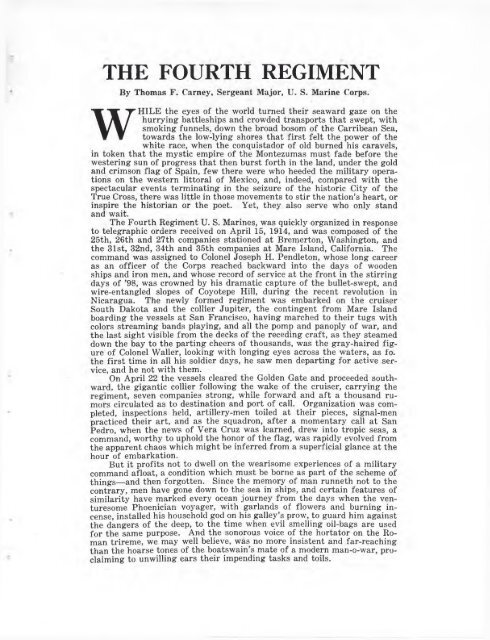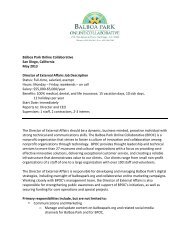Army and Navy Review 1915 Panama-California Edition - Balboa Park
Army and Navy Review 1915 Panama-California Edition - Balboa Park
Army and Navy Review 1915 Panama-California Edition - Balboa Park
You also want an ePaper? Increase the reach of your titles
YUMPU automatically turns print PDFs into web optimized ePapers that Google loves.
THE FOURTH REGIMENT<br />
By Thomas F. Carney, Sergeant Major, U. S. Marine Corps.<br />
W<br />
HILE the eyes of the world turned their seaward gaze on the<br />
hurrying battleships <strong>and</strong> crowded transports that swept, with<br />
smoking funnels, down the broad bosom of the Carribean Sea,<br />
towards the low-lying shores that first felt the power of the<br />
white race, when the conquistador of old burned his caravels,<br />
in token that the mystic empire of the Montezumas must fade before the<br />
westering sun of progress that then burst forth in the l<strong>and</strong>, under the gold<br />
<strong>and</strong> crimson flag of Spain, few there were who heeded the military operations<br />
on the western littoral of Mexico, <strong>and</strong>, indeed, compared with the<br />
spectacular events terminating in the seizure of the historic City of the<br />
True Cross, there was little in those movements to stir the nation’s heart, or<br />
inspire the historian or the poet. Yet, they also serve who only st<strong>and</strong><br />
<strong>and</strong> wait.<br />
The Fourth Regiment U. S. Marines, was quickly organized in response<br />
to telegraphic orders received on April 15, 1914, <strong>and</strong> was composed of the<br />
25th, 26th <strong>and</strong> 27th companies stationed at Bremerton, Washington, <strong>and</strong><br />
the 31st, 32nd, 34th <strong>and</strong> 35th companies at Mare Isl<strong>and</strong>, <strong>California</strong>. The<br />
comm<strong>and</strong> was assigned to Colonel Joseph H. Pendleton, whose long career<br />
as an officer of the Corps reached backward into the days of wooden<br />
ships <strong>and</strong> iron men, <strong>and</strong> whose record of service at the front in the stirring<br />
days of ’98, was crowned by his dramatic capture of the bullet-swept, <strong>and</strong><br />
wire-entangled slopes of Coyotepe Hill, during the recent revolution in<br />
Nicaragua. The newly formed regiment was embarked on the cruiser<br />
South Dakota <strong>and</strong> the collier Jupiter, the contingent from Mare Isl<strong>and</strong><br />
boarding the vessels at San Francisco, having marched to their tugs with<br />
colors streaming b<strong>and</strong>s playing, <strong>and</strong> all the pomp <strong>and</strong> panoply of war, <strong>and</strong><br />
the last sight visible from the decks of the receding craft, as they steamed<br />
down the bay to the parting cheers of thous<strong>and</strong>s, was the gray-haired figure<br />
of Colonel Waller, looking with longing eyes across the waters, as for<br />
the first time in all his soldier days, he saw men departing for active service,<br />
<strong>and</strong> he not with them.<br />
On April 22 the vessels cleared the Golden Gate <strong>and</strong> proceeded southward,<br />
the gigantic collier following the wake of the cruiser, carrying the<br />
regiment, seven companies strong, while forward <strong>and</strong> aft a thous<strong>and</strong> rumors<br />
circulated as to destination <strong>and</strong> port of call. Organization was completed,<br />
inspections held, artillery-men toiled at their pieces, signal-men<br />
practiced their art, <strong>and</strong> as the squadron, after a momentary call at San<br />
Pedro, when the news of Vera Cruz was learned, drew into tropic seas, a<br />
comm<strong>and</strong>, worthy to uphold the honor of the flag, was rapidly evolved from<br />
the apparent chaos which might be inferred from a superficial glance at the<br />
hour of embarkation.<br />
But it profits not to dwell on the wearisome experiences of a military<br />
comm<strong>and</strong> afloat, a condition which must be borne as part of the scheme of<br />
things— <strong>and</strong> then forgotten. Since the memory of man runneth not to the<br />
contrary, men have gone down to the sea in ships, <strong>and</strong> certain features of<br />
similarity have marked every ocean journey from the days when the venturesome<br />
Phoenician voyager, with garl<strong>and</strong>s of flowers <strong>and</strong> burning incense,<br />
installed his household god on his galley’s prow, to guard him against<br />
the dangers of the deep, to the time when evil smelling oil-bags are used<br />
for the same purpose. And the sonorous voice of the hortator on the Roman<br />
trireme, we may well believe, was no more insistent <strong>and</strong> far-reaching<br />
than the hoarse tones of the boatswain's mate of a modern man-o-war, proclaiming<br />
to unwilling ears their impending tasks <strong>and</strong> toils.







